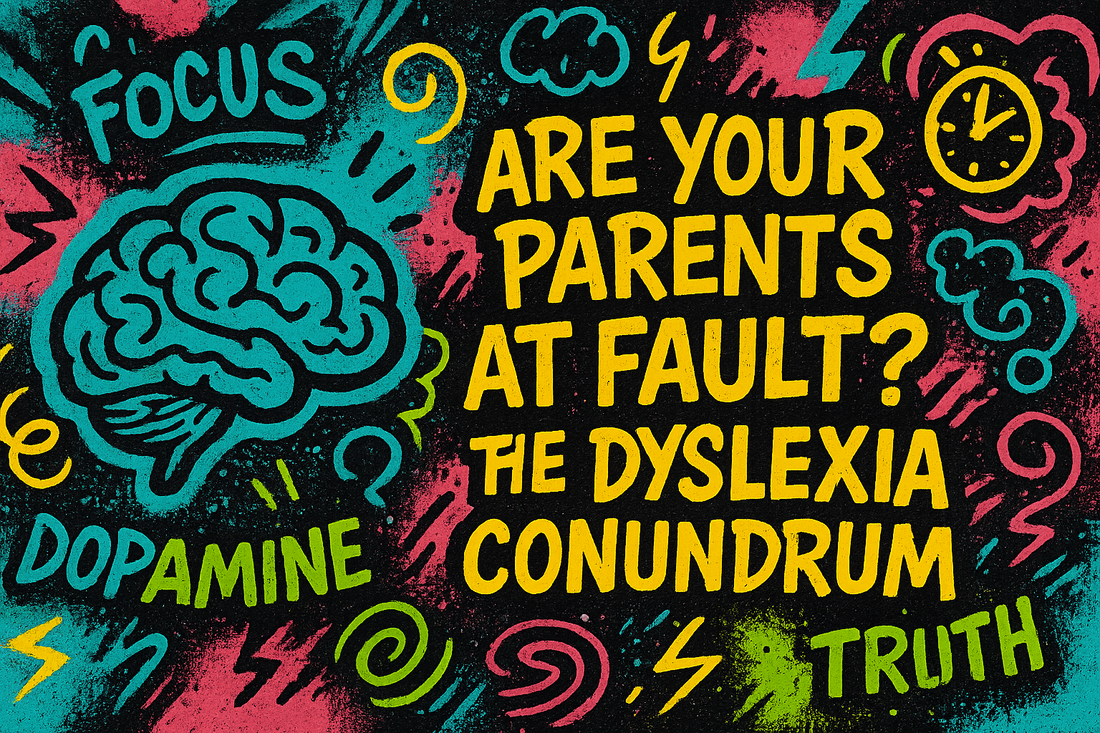
Are Your Parents At Fault? The Dyslexia Conundrum
Share
Ever felt like each day is a puzzle, and no matter how many pieces you fit together, something still feels off? That’s exactly what hit home in this latest episode. We dive into the emotional side of dyslexia, ADHD, and autism—especially the difference it makes depending on how early or late you’re diagnosed.
Stephen Martin candidly shares his own story of blame and forgiveness. He takes us through how learning about dyslexia, ADHD, and autism shifted his picture of self-worth. Then he reveals why forgiving himself and his parents opened the door to deeper understanding and personal growth.
Uncovering the Strength in Knowing
There’s a moment in life when someone hands you a name for what’s been tripping you up. Dyslexia, ADHD, autism—it sounds scary at first. Yet it’s also a key that can unlock fresh confidence.
Stephen found that these labels brought a new perspective. He realised his thinking patterns weren’t “wrong,” they were just different. Instead of pigeonholing him, the diagnoses helped him accept why things seemed challenging and how to better work with his brain.
It can be a little surprising how much relief you feel just by having these terms. You’re not searching in the dark anymore. That’s powerful. And for Stephen, re-labelling his quirks as signs of neurodiversity gave him renewed hope.
Letting Go of the Parent Blame
When we think of our childhood, we often point the finger at our parents. They didn’t notice or they didn’t try. Maybe they didn’t protect us. It’s easy to see them as the source of our difficulties.
But Stephen discovered that blame only blocked his progress. He said:
“I used to blame my parents, but that just kept me stuck in the past.”
This shift in thinking can happen quickly once you step back. Most parents are doing the best they can with what they know. That realisation alone can lift a massive weight off your shoulders. It doesn’t erase any pain, but it helps you see your parents as humans with limited knowledge, not villains in your personal story.
Forgiveness as a Gateway to Growth
There’s a subtle power in forgiving both yourself and others. It might feel unfair at first—shouldn’t someone be held accountable? But Stephen points out that forgiveness isn’t a free pass. It’s a way to let go of resentment so you can move forward.
He explains how this process gave him space to pick up new tools for personal development. The act of forgiving also helped him adjust how he speaks to himself in daily life. It turned the harsh voice in his head into a kinder coach, which improved his emotional health.
Embracing Neurodiversity
We hear the term “neurodiversity” more often these days. It’s a reminder that not everyone thinks or learns in the same way. For Stephen, these diagnoses mean he’s wired in a unique way, not that he’s broken.
When you see yourself through the lens of neurodiversity, you start to celebrate differences. You notice how some tasks might be hard, so you find creative workarounds. Or you embrace what you’re naturally good at—like seeing patterns normal thinkers might miss.
That shift to self-acceptance is what leads to empowerment. With the right perspective, a label can be your ally. It guides you to communities, resources, and fresh ways to handle day-to-day life.
Redefining Your Story Moving Forward
Ultimately, this episode highlights how crucial it is to own your story. Even if you only got diagnosed as an adult, that knowledge gives you the opportunity to reshape your narrative. You’re not late, you’re right on time for your next chapter.
Stephen emphasises that letting go of shame and anger can lighten the journey. It’s about showing empathy to yourself and to those who played a role in your life. Doing this releases the tension that keeps you from growing.
Each day brings new insights, especially when you stay open to learning. You might not fix everything overnight, but small steps can encourage big wins down the line.
- Labels bring clarity and can boost self-acceptance.
- Parents rarely have all the answers—empathy helps us reconnect.
- Blame keeps us stuck; forgiveness moves us forward.
- Neurodiversity means we’re unique, not deficient.
- Your inner voice shapes your self-worth.
Takeaways
- Early or late diagnoses both shift your view of who you are.
- Forgiving yourself and your parents promotes emotional freedom.
- Embracing neurodiversity changes isolation into empowerment.
- Seeing your differences as superpowers can boost self-belief.
Curious to hear more? Hit play on the podcast player at the top of the page for the complete conversation. You’ll find out how these diagnoses can reshape your life, and you’ll discover why forgiveness might be the missing link in your own journey.
If you want to continue exploring, visit truthaboutdyslexia.com for more insights and resources. You can also join our Facebook group at facebook.com/groups/adultdyslexia to connect with like-minded thinkers. And if you're curious about our RightSiders supplement journey, check out rightsiders.org/wait-list to see what's brewing.
Listen now and start re-writing your story with a lighter heart.

